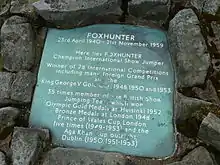Harry Llewellyn
Sir Harry Morton Llewellyn, 3rd Baronet CBE DL (18 July 1911 – 15 November 1999) was a British equestrian champion. He was born in Aberdare, South Wales, the second son of a colliery owner, Sir David Llewellyn, 1st Baronet.
| Olympic medal record | ||
|---|---|---|
| Equestrian | ||
| Representing | ||
| 1952 Helsinki | Team jumping | |
| 1948 London | Team jumping | |
Background
A younger son, Llewellyn was second in line to inherit the baronetcy on the death of his father. He was educated at Oundle School and at Trinity College, Cambridge, before going into the army. He inherited the title on the death of his older brother, Sir Rhys Llewellyn, 2nd Baronet in 1978. His younger brother Sir David Llewellyn was a Conservative politician.
Early career
He achieved some success as a show-jumping champion during the 1930s, and competed in the Grand National steeplechase, coming second in 1936.
World War II
During World War II he saw action in Italy and after D Day in Normandy and served as a liaison officer to Field Marshal Montgomery, eventually rising to the rank of Lieutenant Colonel in the British Army. He was appointed Officer of the Order of the British Empire (OBE) in 1945 and Commander in 1953 for services to British International Show Jumping.
Olympic Gold Medal

After the war he concentrated on show jumping, buying Foxhunter in 1947 after a long search. The duo were part of the British team that won a bronze medal in the team event at the 1948 Summer Olympics, winning the bronze medal. They captured the public imagination for their role in winning Great Britain's only gold medal at the 1952 Summer Olympics, in the team jumping equestrian event.[1]
Foxhunter and Llewellyn won 78 international competitions during their joint career. Llewellyn later served widely in the administration of British show jumping, and was knighted in 1977 before inheriting the Llewellyn Baronetcy upon the death of his brother.[1] His business activities, following the nationalisation of the coal industry in 1947, included interests in brewing and television. Following the 1952 Olympic win he set up a chain of cafes called Foxhunter.[2]
After Sir Harry's death, his ashes were scattered near Foxhunter's grave and memorial on the Blorenge mountain above Abergavenny.[2]
Family and personal life
Sir Harry Llewellyn lived near Abergavenny in Monmouthshire. In 1990 he was inducted into the Welsh Sports Hall of Fame.
He was married to Christine Saumarez, a daughter of the 5th Baron de Saumarez.
Their sons, Dai and Roddy, became well-known media personalities from the 1960s onwards, the former because of highly publicized relationships with Tessa Dahl and Orson Welles's daughter Beatrice, and the latter because of an eight-year affair with Princess Margaret, Countess of Snowdon.
Notes
- Murphy, Genevieve (17 November 1999). "Sir Harry Llewellyn Bt" (obituary). The Independent.
- Butler, Eddie (25 May 2012). "Olympic torch route, day 7: Abergavenny's hero, a horse called Foxhunter". The Guardian.
References
- databaseOlympics.com
- Kidd, Charles, Williamson, David (editors). Debrett's Peerage and Baronetage (1990 edition). New York: St Martin's Press, 1990,
External links
- BBC article
- Biography of Sir Harry from Oundle School Society
- The Times Great British Olympians
- Leigh Rayment's list of baronets
| Baronetage of the United Kingdom | ||
|---|---|---|
| Preceded by Rhys Llewellyn |
Baronet (of Bwllfa) 1978–1999 |
Succeeded by David St Vincent Llewellyn |